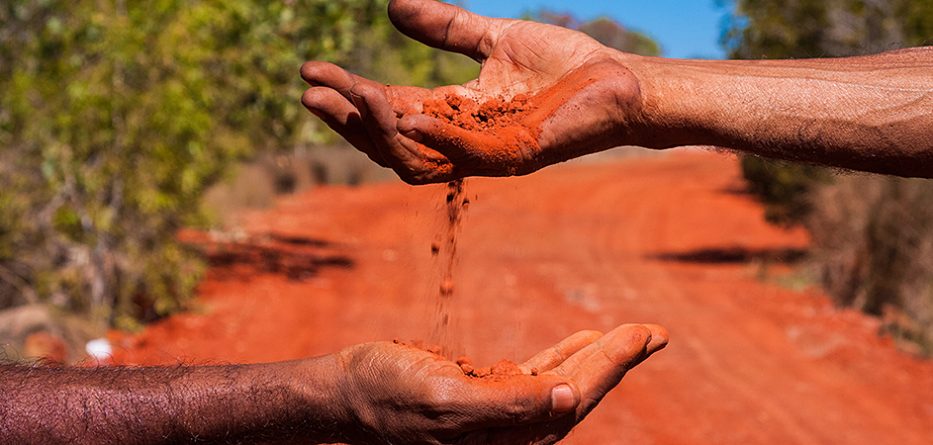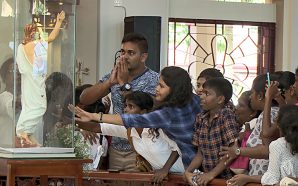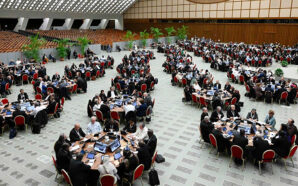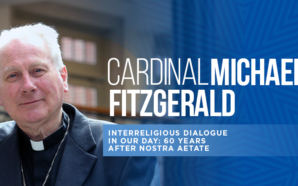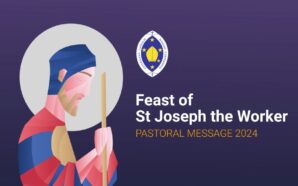I recently returned from several weeks in the Kimberley catching up with Aboriginal friends. It was a trip I first made some 50 years ago and one I have repeated for sustained periods of time in the decades that followed. It is one I like to repeat each year. Despite the sadness I experience when seeing the intergenerational price that colonisation has paid in the north-west of Australia, I always enjoy catching up with old friends, reminders of cultural practice, hearing local languages, seeing early morning sunrises and having sunset conversations. I count myself as most blessed and fortunate, belonging to that small minority of Australians who have a number of Aboriginal friends, having enjoyed their company over many years and grateful for what I have learned from them.
When the 1967 Referendum was passed, I was only nineteen years old. I grew up in Melbourne and at that time knew no Aboriginal person and nothing of their cultures, much less their history, hopes and dreams. It was when I accepted an invitation to join a youth camp at Lake Tyers in 1970 that the world of the First Australians opened up for me.
They were challenging times, those early 1970s, listening and discovering what it meant to be an Australian through the eyes and words of Aboriginal people. Then, it was mainly Victorian Koories. I had come out of a post-war, rising, privileged, middle-class environment in Melbourne. But I knew nothing about racism or prejudice or the White Australia policy or the Frontier Wars. I still remember being challenged about the power of the colour ‘white’.
Living and understanding life in the north-west of this country was something else again. The Aboriginal communities were small in number, each with their own first contact histories and sometimes distinct languages. The weather was much hotter than the south, roads largely dirt and resources poor. It was only in time that I began to hear their experiences of the past, the roles their key leaders had assumed in encountering the invaders to their land along with adapting to the later uncertainty and vulnerability of life constrained by missions, cattle stations, government reserves but always under government intervention and control, and the ever-present power of the police. Over time, I heard other stories, many of them involving violence, some police related. The stories of past massacres came later.
I entered this northern Aboriginal world just as the institutions that had shaped control of their lives and families over many decades began to be dismantled. For example, it was after the 1967 Referendum that the boys and girls’ dormitories at Balgo Mission in the east Kimberley were closed in 1973. In the west Kimberley at Beagle Bay Mission they were closed in 1976. A whole generation of children had grown up in these dormitories, physically and culturally separated from their parents and families.
At the same time, after the 1967 Referendum and into the early 1970s there was a sense that a new era was coming. Aboriginal people would be integrated not assimilated, more self-determination, no longer dependent or controlled by those who ran missions or reserves. Access to alcohol was no longer illegal – though the conditions in some towns and hotels were rough and crude and often discriminatory – and then there was the opportunity for travel. People could travel without the permission of authorities. Cars, mainly old and second-hand, appeared and opened up new opportunities for travel and the visiting of relations in other communities.
Despite the energy and hope of those years, no ‘promised land’ appeared. As a generation of people had settled into mission and reserve life, they now found themselves separated from their ancestral lands. This separation highlighted a key emotional and spiritual relationship people had with the ‘country’ of their ancestors as it also highlighted their inability to return and live on it. No longer were important ceremonies regularly held or conducted and, for those whose connection to the land and its relationship to themselves was a deeply spiritual and relational one, something began to die. Not a simple event or moment but a gradual dying of many peoples’ spirits as what had regularly nourished their spirits no longer could do so.
I have witnessed many expressions of this dying. I lament the many deaths caused by suicide, domestic violence, motor vehicle accidents and a range of health issues. Many I have known and much younger than myself. Every time I visit these communities I find myself spending time in the cemeteries lamenting old friends whose lives were cut far too short.
I now sense a new expression of dying in communities that once were united but now express clear divisions with inter and intra-family tensions. I believe it is the result of a widespread infection of fatalism. While this may seem to be a recent infection its origin can be traced back to early colonisation where Aboriginal people quickly lost access to their land, waterholes and food resources, sometimes quite brutally. Disconnected from listening to what had deeply nourished them spiritually for centuries their spirits struggled, courageously at times, to face the added onslaught of forcible removal, frontier violence and disease. Fatalism affected the spirits of men in very particular ways as they could no longer defend their land or protect their families.
Today, many old and young have given up hope of what they can control and change to make their lives more joyful, enjoyable and healthy. In turn, they take their frustrations out laterally – sometimes physically, verbally and violently – on those closest to them, and not at the deeper sources of their poverty, discouragement and pain. I believe we are now witnessing many people who have internalised the rejection we white people presented in early days of contact and have maintained as the dominant culture. We believed we were superior then, as we can now, excusing ourselves to find no reason to listen or learn from the past. What began as experiences of rejection have slowly internalised into the inevitable frustrations of living with powerlessness.
How has it come to this? I am aware that my perspective is my own and limited but I am now witnessing children and grandchildren of those born and who grew up in those early 1970s. Their parents and grandparents grew up in a time of radical community change and cultural disruption, possibly the most serious since first contact experiences. The first adult graduates of mission and reserve life had some understanding of how white people thought and acted. Their English was good and with various involvement and acceptance of Christianity. But they were not graduates with inner confidence or with the cultural knowledge of their parents to face a rapidly changing Australian world after the 1967 Referendum. Nor were they well prepared for the confluence of addictions they were then offered: tobacco, alcohol, pornography, drugs and gambling especially. Or the influence of processed food, fast food outlets and sugar. Coca Cola continues to hold a prominent place in many community stores. And this is before we mention the conflicting values of a dominant society that place great emphasis on individuality, competitiveness and material possessions. Secularism before spirituality.
This is not to argue that life in the missions or reserves was perfect or even ideal. Depending on those in charge at the time, life could vary from the benefits of benevolent dictatorship to that of the cruelty of harsh dictators. Generally, people were fed, housed and offered some primary health care. And families were often located together. However, many decisions affecting key aspects of their lives were made by those in charge – mainly white men – and without consultation. Rarely, were people asked or had a say in or how they were to live, work, perform important ceremonies or how they wished to engage the wider Australian world.
Government and Church justified the removal of children from their families believing that there was no other way. Whether Aboriginal people would die out as some thought or, if they survived, it was important to give the children a chance to learn and adapt to the dominant western culture. There was no distinction between a pastoral desire to protect people from harm (read, frontier violence), the assumptions of western culture (read becoming ‘civilised’) and the gifts of Christianity (read, adopting one of the available post-Reformation tribal Christian identities). These three foundations of control came together as one, providing those in charge with the belief they could do no wrong and implement what they judged to be right. There was never any sense that they might ask the local people what they thought. Our national and local lack of listening to First Nations’ voices has a long history.
In offering these reflections I admit it is not the whole picture. There are many stories of resilience and hope and where people have found a way to express their lives in all sorts of positive and creative ways. And, in the context of intergenerational trauma, there are also signs of intergenerational life such as the children of artists who have learned to paint in their family’s tradition, faithful to the past but communicating life and hope for the future.
However, I believe this coming Referendum draws a line in the sand for our nation. It is much more than a Voice to Parliament. It is about our willingness to recognise that from the very beginning of colonisation we have struggled to listen. We struggle personally, in our institutions and in government. We are too busy to stop, sit and learn the ‘language’, whether literally or metaphorically, of the local people. Ultimately, we feel distant, often afraid and sometimes deeply ashamed and even guilty. This ‘blood on the wattle’ is slowly seeping into our consciousness as is also the long-term effects of a failed relationship. We struggle to grasp the implication of their living with the obligations of kinship, having a spiritual connection to the land, the ancestral dreamtime (‘time before time’), and how the moment of conception can link us to creation through totemic relationships. In the busyness of our lives we can lose touch with our inner spirits and forget we share a common humanity. They have much to teach us.
One of the gifts of older age and having long-term friendships is that it is now easier for me to pause and listen to people’s stories. Every time when I am invited to listen to one of my Aboriginal friends, I am taken into a new depth of shared humanity that sometimes challenges, can even unsettle, but always is gift. I have come to realise that I have had no good reason to fear listening. It can be important for the person to be able to tell their story but it is also important for me to hear it. I hear deep pain and hurt, such as the adult who has never known their white father, or the male who carried a woman who had been sexually assaulted to the police only to find himself arrested and locked up for several days. Or adult men who remember being taken as juveniles by the police back to town after committing offences but stopping along the way to receive a physical beating. Or those adults who remember their dormitory was like a ‘prison’ where they were not allowed to visit the camp where their parents and families were living. I feel for the parents of those children – teenagers and young adults – who have committed suicide and who struggle to overcome their grief. And then there are the painful memories of the massacres of ancestors, stories that were handed down by the old people and which have only been more honestly and publicly acknowledged in recent decades.
In the many stories that I have been privileged to hear, I realise that listening more deeply to their history is important, not just for truth-telling and being more open and honest about our past, but for the health of my soul and theirs and that of our nation. I may be 96 per cent of Celtic origin but I was conceived, born, educated and grew up in this land. I have been privileged to have the opportunity to learn some language and culture. I have been invited into men’s law and ceremonies. I may not be a First Nations person but I believe the health of my soul seeks to be intimately connected with theirs and this ancient land.
The Voice cannot be a simple panacea for all that needs to be healed and revitalised in this country. It will only be effective if it is given a chance and one that brings Australians, wherever they live and however they are connected to First Nations people, to a new commitment to listen. What lives deep within us – whether we were conceived, born, grew up or are a recent arrival or visitor to this country – is what can unite us. We have the choice of seeking to belong to one ancient human timeline or separate, alone and ultimately impoverished. The gift of the Voice is this opportunity to become a more deeply united and spiritual people. Ultimately the good of our national soul.
The Voice has a national focus but it cannot work unless there is listening at local and community levels as well. It will not be enough to have a national voice if we, that is each of us, does not seek to take this new step of listening. A listening that allows the great mix and variety of First Nations people to each have their say, tell their story and know that they are being heard. And, if we truly listen, our own selves will be changed and theirs will also as the places of brokenness and opportunities for healing will be revealed. It is a spiritual homecoming that we are being offered.
A vote ‘YES’ in the Referendum is a commitment to keep listening and hear the pain and hurt of past generations and what so many First Nations people have courageously carried for so long. We cannot remove that pain and hurt but we can begin to listen attentively to those closest to us and allow ourselves to be converted into a new relationship with them. And, in such listening, to allow them to rise up with new hope and courage. Knowing they have been heard, knowing that new foundations for living together in trust and hope have been laid.
Our country has moved a long way since 1788. And yet we struggle to listen and acknowledge that we can cling onto old views of cultural superiority. Initiatives that encourage us to acknowledge the First Nations’ name of the particular place on which we live has been an important step. It provides us with the opportunity to listen more deeply to our local history and shared humanity. We can belong to an ancient culture in ways our ancestors never imagined.
And, for those of us who are privileged to live and move at that interface between our cultures, we can too easily forget what we have learned and been taught. We can forget that we belong to a dominant culture that continues to dominate in all sorts of subtle, sometimes not so subtle, ways. And, by being too busy to stop, listen and remember we further people’s experience of hopelessness and fatalism.
Hence, when voting in the coming Referendum I will vote ‘YES’. Yes for constitutional recognition. It is time. ‘Yes’ for the soul of this country. We are all in need of healing. But, and above all, ‘Yes’ to LISTENING. Listening to the unique gifts and graces our First Nations people bring us. ‘Yes’ to a deeper listening in the future in Canberra but also in my heart, home and wherever I travel upon this most ancient of lands.
Brian F. McCoy SJ is a Jesuit priest who first went as a seminarian to the Kimberley in 1973. He worked in Balgo Mission (as it was then called) and later in the Mirrilingki Spirituality Centre (neighbour to the Warmun Community), Broome (Royal Commission into Aboriginal Deaths in Custody) and in the Balgo/Kutjungka region as parish priest. He returned to the Kutjungka region in 2001 to complete a Doctorate (University of Melbourne) on the cultural meaning of kanyirninpa (holding) in the context of the health of Aboriginal men. This was later published as Holding Men: Kanyirninpa and the Health of Aboriginal Men.
This article was originally published on Eureka Street, a publication of the Australian Jesuits. Reproduced with permission.




